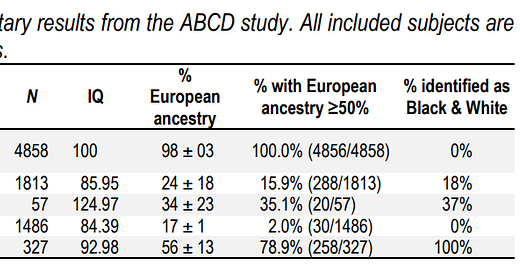This is a paper I have submitted recently to Mankind Quarterly (Finally published). Results and syntax are made available in the spreadsheet for replication purposes. In this post, I'll go over the main analyses and discuss related papers.
European ancestry was found to be positively associated with higher cognitive ability scores among Black Americans in two separate data : The NLSY79 and ABCD.
In the NLSY sample, I used self reported ancestry variables as an approximation for ancestry (alternatively, see my earlier paper using skin color). Using Jensen's method of correlated vectors, after accounting for reliability subtests, I found that the ASVAB subtests g-loadings positively correlated with group differences. The found correlation (r=0.40) was lower than other analyses which generally reported a Jensen effect of r~0.60. As for the second analysis, I restricted the Black sample to NLSY79 respondents with 2 SD above the mean, the sample was small (N=99) yet 3 respondents had reported having European ancestry, equivalent to 3%. For how reliable this is, this percentage is higher than the corresponding number of 1.81% found in the total sample.
In the ABCD sample, the analysis is a follow-up to the paper published by Fuerst et al. (2021). European genetic ancestry was assessed with autosomal SNP variants. It was found here again that Blacks with more European ancestry performed better on g scores (computed from the NIH Toolbox cognitive battery). Looking at the African American subsample with 2 SD above IQ mean and having =>50% European genetic ancestry (N=57), we were left with 35% of the subjects compared to 16% in the total Black sample. This further validates the idea that Blacks with more European ancestry are more likely to be found at the upper end of IQ levels.
This paper generally evaluates Witty and Jenkins (1934) statement that if ancestry is associated with intelligence among admixed populations, then the right tail should be overrepresented with more admixed individuals. And this is exactly what was found.
Now, to discuss Fuerst et al. (2021). We found that African and Amerindian ancestry are strongly negatively associated with general cognitive ability among US ethnic minorities : African, Hispanic, and Other American subsamples. We followed the same procedure for all subsamples. In our mixed effects models, the first model typically considers ancestry effects, the second model adds self identified race/ethnicity (SIRE), the third model adds "discriminatory" variables such as skin color, state racism, feelings of discrimination, the fourth model finally adds SES. In the Black sample, only ancestry measures and SES correlated with g. However SES did not attenuate the association between ancestry and g. In the Hispanic sample, both Amerindian and African ancestry showed substantial associations with g, while SIRE and discrimination didn't, but SES attenuated the effect of our ancestry indices. In the Other American sample, the result was similar to the Hispanic sample, since we found significant effect of our ancestry measures while SES variables attenuated such association.
Overall the research is meaningful in a way that we offered a solution to the problem of decomposing genetic and environmental variances.
Other studies worth taking a look at are Lasker et al. (2019) and Pesta et al. (2020). Similar to Fuerst et al. (2021), Lasker found a relationship between European admixture and g among African monoracial and biracial samples while controlling for SIRE, SES and discriminatory variables and except (moderately so) for SES none of these confounding factors altered the association between ancestry and g; furthermore a strong Jensen effect was found on European ancestry and for the subtest correlations with the MTAG Education-Related Polygenic Scores (eduPGS). Pesta conducted a large meta-analysis of studies on group differences in the heritability of intelligence, examining separately the three components which are known as additive genetic, shared environment and nonshared environement. It was found that heritability differs little among Whites, Blacks and Hispanics.



